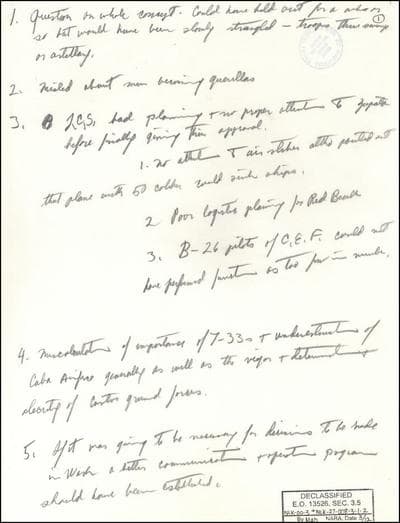Advertisement
Declassified Papers Provide New Window Into RFK's Role As JFK's Closest Adviser


Ever since Robert F. Kennedy was assassinated in 1968, researchers have been trying to get access to thousands of classified documents about his role in the Cuban Missile Crisis, which happened 50 years ago this month.
And now they're getting their wish. On Thursday the John F. Kennedy Presidential Library & Museum released seven boxes of RFK's papers on Cuba from when he was attorney general.
One of the many people combing through these documents is Lexington author Larry Tye, who's working on a biography of RFK. WBUR All Things Considered host Sacha Pfeiffer spoke with Tye on Thursday and asked him what kind of information is included in those 2,700 pages.
Larry Tye: They're memos that include materials from the State Department, from the CIA, from the FBI, and they give a little bit of a picture not just what happened during the Bay of Pigs crisis and the Cuban Missile Crisis, but afterwards.
Sacha Pfeiffer: This has obviously been such a studied historic event. Any major surprises in these papers so far?
Well, I think what's interesting — there are a few things that struck me as I looked through the documents. One was that we were understandably involved with ongoing aerial surveillance of the island of Cuba. And I could read you a bit of that if you'd like. This memo begins:
It can be stated that our continuing aerial surveillance requirement is to obtain complete, high-level coverage of Cuba and the Isle of Pines each 30 days, plus a sufficient number of low-level flights or on-site ground inspections to check out specific locations which may appear to be suspicious.
And what they're really saying there is this is exactly how we found out that there were Russian missiles being installed in Cuba and how the missile crisis came up in the first place. So while we were supposedly in a period of calm after the crisis, in fact we were in a steady state of alert and worried about the chance for another crisis to arise at any moment.
And Larry, the document you just read from was not written by RFK, but it was advice to the president?
It was, indeed. And given that RFK at that time was acting as, in a way, the de facto CIA and national security chief, he was not just the attorney general; he was there as his brother's critical eyes and ears in the intelligence community generally and specifically when it came to Cuba. Because after the Bay of Pigs and the breakdown of intelligence then, Jack Kennedy didn't really trust anybody other than maybe his brother Bobby.
This gets at something that the Kennedy Library acknowledges, which is that these Cuba-related papers that RFK accumulated when he was the attorney general normally wouldn't come under the AG's jurisdiction. Does that suggest to you that Bobby Kennedy's involvement with Cuba issues was inappropriate in some way?
It suggests to me that it was exceptional, but not necessarily inappropriate. Exceptional because, as I say, the president didn't trust his intelligence community. He felt that they had misled him and the military hadn't given him the kind of support and the kind of briefing that he had required before the Bay of Pigs.
That disappointment that JFK felt in his military advisers comes across very much in some of Bobby Kennedy's handwritten notes after the Bay of Pigs invasion. Those notes were very critical of the administration's planning of the operation. One says, "Underestimation of Cuban air force generally, as well as the vigor and determination of Castro ground forces." Another says, "Never would have tried this operation if knew that Cuba forces were as good as they were and would fight." Does that tell us anything that wasn't already known about the failure of that invasion?
We knew that immediately, even a day after the failure of the Bay of Pigs invasion, Jack Kennedy was outraged at what he thought was a failure of his intelligence community and that he had called in his brother to take an active role in charting the next course against Cuba.
As you read these, did this sound like Bobby Kennedy feeling defensive or protective of his brother Jack, perhaps because his brother had received bad military advice?
Yes, he was feeling hugely defensive of his brother Jack. That, after all, more than his role as attorney general or as a national security adviser, it was having Jack Kennedy's back that he defined as his most critical role in the administration. And here was the biggest disaster that had yet confronted the new administration.
There are still many boxes of materials to be declassified and made public. What's your sense of whether there could be bombshells in there or just interesting tidbits continuing to trickle out?
I'm an RFK biographer and I would love there to be bombshells in the 55 boxes of documents that are remaining to be made public, and I hope there are. But these documents that were just released suggest that the kind of revelations are going to be more in adding color but not dramatic new revelations to things we knew about some of the most studied events in the American history, like the Bay of Pigs and the Cuban Missile Crisis.
This program aired on October 11, 2012.

